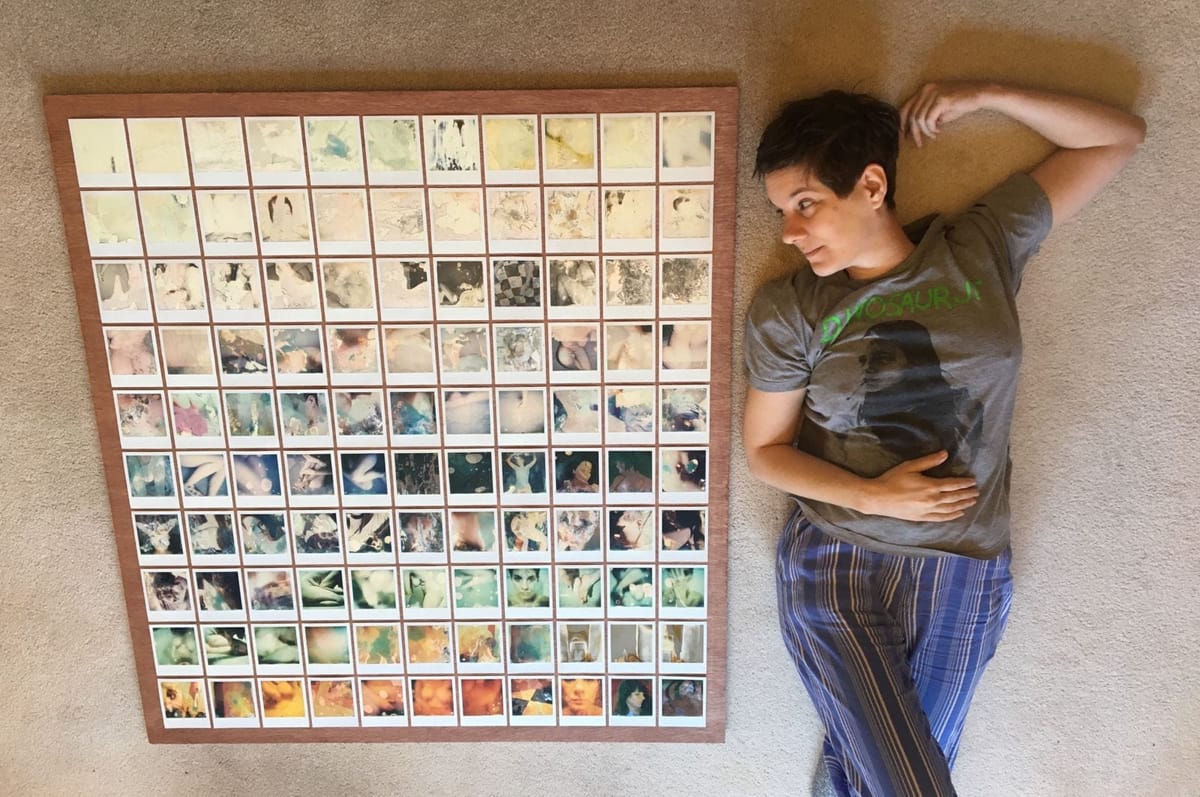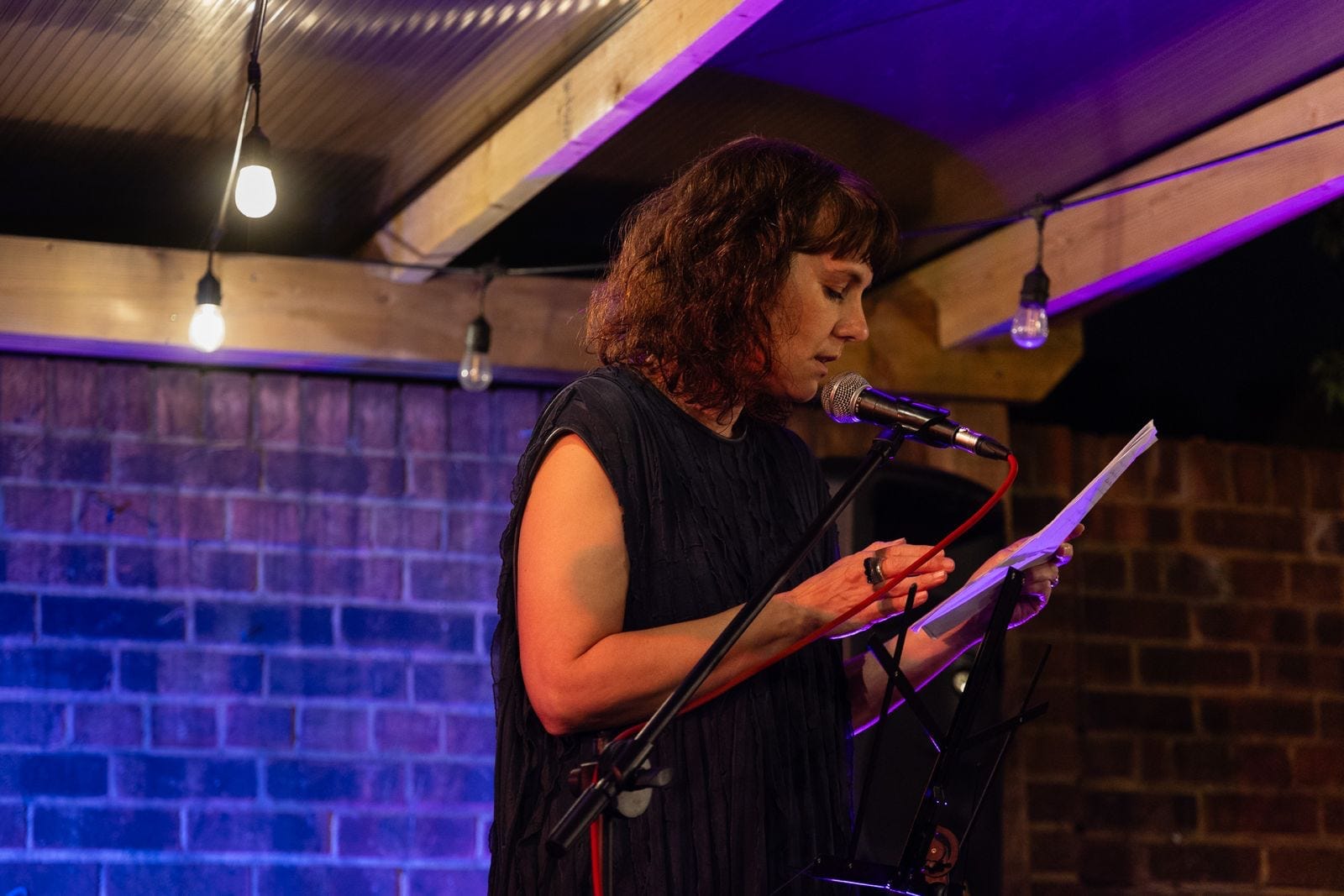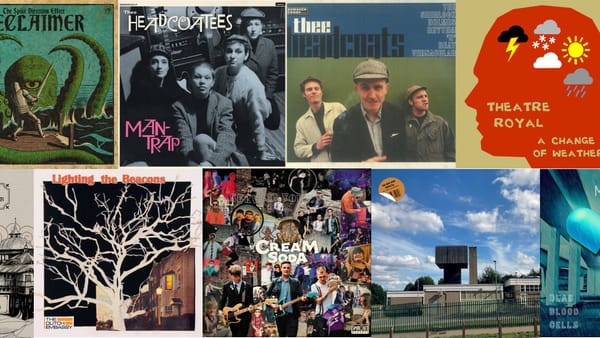“It's about seeing the beauty in the broken”
What Steven asked artist and poet Zara Carpenter

Something slightly new this week, with our first two-part interview! Steven sat down with creative duo Zara Carpenter and Rikard Österlund. In the first part, we focus on Zara and hear what she and Rikard have to say about performing poetry, attacking Polaroids with hammers, and the difficulties of having a relationship with a working artist.
As usual, our Sunday interviews are paywalled about halfway through. There’s a lot to get stuck into for free readers, but if you want to keep going and support our work, please consider upgrading your subscription. Today is the final day you get a full year of Local Authority for only £40.

Where were you born?
Zara: Chatham, All Saints. Chatham girl, through and through.
How did you both meet?
Rikard: It was sort of weird because a lot of our friends knew each other. My friends would go to parties where Zara had been, but we didn’t meet each other until one afternoon I was photographing a final year student’s fashion show. Zara had been asked to model. That’s when we probably first saw each other, when Zara came down the catwalk.
Zara: I had refused to do the show. It was my friend’s final collection, and I said ‘I'm at least 10 years older than everybody else and also I walk with a limp, I'm not doing it.’ She spent weeks and weeks saying ‘Yeah, you are.’ I said okay and I was terrified. I remember being absolutely terrified and then walking out and when as I was halfway down the catwalk, I just saw Rikard and I thought I could do the walk for him (laughs). Then it was a couple of weeks later that we bumped into each other. It was at the Tap ‘n’ Tin, and if I ever liked anybody I would avoid them because I'm really useless at trying to get somebody's attention. I’d had a tiny bit to drink and I was a bit tipsy so I marched over and said ‘I’m Zara’ and Rikard said he knew who I was because his friends had read my books and that he was really interested in working with me.
What jobs did your parents do growing up?
Zara: My dad was a hairdresser. He had a hairdresser’s just where the Tap ’n’ Tin is. Next door to it, it was called Long John’s. It was really famous back then in the 70s.
Rikard: And the 80s.
Zara: Yeah, not only was he a hairdresser, but he also did hairdressing competitions. We would go all over the country and he would do insane things to people’s hair. My mum was a housewife, but then later she worked in an antique shop. She was always quirky and doing lots of things at home. She would spin wool and weave and crochet and knit.
How did you find school and university?
Zara: Hated it. Really struggled. I found out about four or five years ago that I am dyslexic. I think I was bright, but not academic. My secondary school was a really troubled school. We used to just copy from the blackboard or books and I never could learn that way. Luckily, the rest of my life was filled with people that took me to museums and galleries, places that fed my mind. I left school with really terrible qualifications. I chose never to go back to education, so I've never done any higher education.
What was your first full-time job?
Zara: Full-time? I did lots of part-time jobs. I worked in a shop for a long time called Artisan for Unusual Things in Teynham. We lived in Chatham until I was six, and then we moved to Teynham. When I was 15, my dad died, and I was told ‘You’ll need to help your mum now.’ I was part-time, and as I got older, I got more and more hours. It was fantastic, a family run shop. They would travel the world buying unusual gifts. They taught me window dressing, framing, everything.
What is your official occupation?
Zara: Artist. I am a working artist.
What additional roles, paid or unpaid do you do?
Zara: I am an assistant to Rikard, so a photography assistant. I am also a workshop facilitator. Also a general dogsbody for the Billy Childish archive. (laughs) Is that it?
Rikard: Amongst other things, poet.
Zara: Yeah, we will ignore that one (laughs).
How did you come to meet and work with Billy Childish?
Zara: I met him when I was in my 20s. I was part of an anthology and they had a book launch at the Nags (Head, Rochester). I remember creeping in at the back. Bill Lewis had asked if I would read, and I said no way. So Bill read it out and then pointed at me at the back. It was Billy, Bill, loads of the Medway greats, and me. I was young and scared at the back. Billy bounced over and said hello. When I moved back to Medway when I was 28, I met up with Bill and Billy. Billy is like family.
Rikard: When we started seeing each other, we would see him and his family for dinner, at ours or theirs. I take a lot of photographs of art for artists, and for the last 12 years, I have photographed all of Billy's paintings.
What is the most difficult thing about being in a relationship with a working artist?
Zara: You never stop working, ever. You never stop talking about it. You never stop thinking about it. You never have a day off, ever, because we both love what we do, but it consumes everything (laughs). Even when you're on holiday, you end up talking about it, or you get inspired by things. You go to exhibitions, and you talk about things, and you are like, ‘I wonder if I could do this.’ It’s all-consuming (laughs).
Rikard: That’s pretty bang on, I think. The other thing that is difficult about it is that by default when you are creative, it's quite a difficult thing to do for a living. It's not very reliable, and then when there's two of us, it just means that there's a lot of ups and downs. Sometimes we're good, when we don't have ups and downs at the same time yeah and you can kind of balance each other out, but then there are times when it's not great for both of us and that's very difficult to manage.
Chatham Girl was published in 2004. What do you remember of the experience?
Zara: It was such a bad time in my life, tumultuous. I broke up with my husband. That was not good, I was very lonely, very used, suddenly I was a single girl and I was going out and partying. Then these incredible, really supportive figures, were in my life, like Billy, Bill and Dave Wise, and they all said you need to put a book out. Chatham Girl is a collection of poetry that I wrote from the age of 15. A lot of it is really teenage, very angry, in your face, completely unfiltered. I loved doing it. I’m revisiting it now because I want to a collection of poetry that includes some of that work. I think I didn’t have the tools to say what I really wanted to say. It was a difficult time, but an amazing time.
Why did you recently return to the stage to perform poetry?
Zara: I have been asked a few times. Lupen (Crook), I’ve known him for the last 20 years. He asked if I was still reading. Nope. He said he wanted me to read. I thought about it for a while, because I trusted him to create a space that I'd feel safe in, where I could actually read the way I wanted to read. A few days before the gig, I said to Lupen, ‘I’m assuming I am first on.’ He said ‘You are going to go on before me.’ He said, ‘You are not an add-on, I think it’s important that you should be heard.’ On the night, I was sitting through the gig, Theatre Royal were on first, and then it was The Missing Persons Project. They were a punk band, screaming through a loudhailer, but the whole night really worked. I knew that it was okay.
Rikard: It came at a really good time because you’d said no to being part of another poetry reading because you didn’t feel ready, but I think that had sown the seed in your head, maybe. In preparation, you didn’t just revisit your old poems, you wrote a few new poems. It’s how our life goes a lot of the time. Our life leads from one thing to another.

What are Japanese Wabi Sabi aesthetics?
Zara: It's about seeing the beauty in the broken, and those things that are fleeting as well. My work is all about that, I didn't realise but there is a thread through all of my work and all the different processes. I am using photography at the moment, and there are sculptures I made in the past, and the paintings as well. I tend to explore these themes that are broken. I think it stems from living in a body that is sick and has always caused me pain, trying to see the beauty in that, and actually see positive things. Also, when you're really poorly, when you have times where the world just slows down to a snail's pace. It gives you the opportunity to see the beauty in tiny things, in imperfections.
You had the SICK! exhibition. Do you remember the process when you tried to embrace that part of yourself?
Zara: It was always there, but I wasn’t vocal about it. I had an exhibition in the Deaf Cat.
Rikard: That was 2010, maybe.
Zara: Rikard was away in Sweden for a while, and I was really poorly and I could barely walk. I was living next door to Heather Haythornthwaite at that point. She was looking after me. She was an absolute sweetheart, she would come round every day, bringing me stews and things like that. She came around with this black sketchbook.
Rikard: Black pages.
Zara: I was taking painkillers and those taking effervescent painkillers. I'd been noticing that sometimes if I wasn't paying attention it would spill over and they've made these lovely marks on the side. I made these prints out of the painkillers. I was taking painkillers four times a day, every day because it was so bad, so I was making these prints. It was about trying to take the pain away, and I was making something that I thought was beautiful. I’d filled the entire book with these prints.
Just before SICK!, my best friend Matt and I were talking about doing an exhibition about the body and specifically sick bodies. I had made Persephone, which was a woman’s head, which I made after I had a bleed on my brain. It was about the fact that I had nearly died and it was about the fact that I had chosen not to have children because I didn’t want to pass on my genetic illness. I'd be making work that was kind of privately about these things, but not publicly saying really what they're about. I started telling people that I was poorly, and not in a ‘feel sorry for me’ way, but just to normalise it. At some point, everybody will be poorly, and we don't talk about it and we shame it. That means people get lost and feel lonely. I just started saying I'm not going to do that anymore. Other people were doing it and that’s when we did SICK!, and that was one of the best things I have ever done. That made me so much stronger as an artist. It was a really weird process because before SICK!, I was doing work apologetically, making work and secretly putting it out. SICK! meant that we had sixteen artists being part of it, and I needed to look after them, to be strong for them. I believed in all of them, and I realised I never believed in myself. SICK! made me start believing in myself.
Rikard: The thing that SICK! did, was that it was about illness, about unbearable conditions, but it was not about the cure. Or if there is a cure. If you were talking to people about your condition, the first thing people would say is have you tried this or that. This was about conditions without a cure.
Zara: And how you live with it.
Why do you like working with Polaroids?
Zara: It was not an accident. I was doing this work called Distress, and it was essentially documenting my body in pain. Initially, I was using a selection of like five images that I was printing out, over and over again, and working into them. I wanted to take photographs of this specific part of my body that was causing me pain that day. I'm not photographer. I’m not interested in taking a good picture, I’m interested in conveying what I was feeling at the time. Polaroid was the easiest way of doing that. When I first started, I was just taking photographs, at arm’s length, pointed at what I thought was my arm or something, and then I'd work into the Polaroid straight away. Polaroid has all the chemistry in it. You can do so much with it, and that's what I’ve been doing for the last five years, working out what you can do with Polaroid, and pushing its limits.
It gave me freedom to be able to document and then when I started getting a bit fancy, I would put the camera on books and I've got cable release and then I could take pictures of the whole of my body. I just really like being able to play with the image and move it around. I'd take a Polaroid and then as it's developing, I would start working into it, with heat and friction. It's like 3 or 4 minutes for the image to develop as it's coming out of the camera. I might boil it, or in the freezer for a little while, or all of those things. I know through doing this over the last five years that if I hit the Polaroid with a hammer as soon as it comes out of the camera, it will do one thing. If I wait two or three minutes, it will do something completely different. I'm not in control really. I'm in control of the act of doing it, but I don't necessarily know exactly what will happen. Effectively disrupting the chemistry makes it even more unstable. It does really strange things. Polaroids that I made two years ago, new colours have come into them, some have receded. They keep changing and a core part of my process is that my work is not static, because I think it is essentially about human experience. We are constantly changing. My work just constantly changes.
Rikard: The other reason you use Polaroid is because of the instantaneous quality of it. It is so important to how you make work. It's obviously because of how it looks, in the effects that you get, but also that you can do it instantly because you are so impatient it’s ridiculous.
Zara: It’s my obsessive compulsiveness. If I have an idea I have to do it straight away or it's like something's shouting in my head until I do it.
(To Rikard) As a photographer, is there a part of your brain that sees someone attacking a print with a hammer and put in the freezer, and has difficulty with that?
Rikard: I’m completely on board. It's not my work. If she was doing it to my work, I would be slightly annoyed. It became clear very quickly that it is not photography at the forefront of the thing. It's a medium, almost like paint with obstructing the chemistry and changing it.
Zara: I honestly don't care about taking a good photograph. It is absolutely about expressing that moment in time and what I can do with it.
Rikard: I think you do care about taking a good photograph, but it’s about taking you where you want to be. It’s not about getting a perfectly composed, perfectly exposed, in focus photograph.
Zara: I was giving an arts talk, and they asked if I was upset if I lose a photograph, but I never see that photograph. I’m always working into it before it develops.
Rikard: I find it intriguing and exciting because it’s just not the way that my brain would work. I don’t think what would happen if we set fire to it.
What was behind your Flowers book?
Zara: I took the photographs in lockdown and they were lots of flowers that were either in my garden or ones that I had been given, or ones I saw on permitted walks. I wanted to do something that was just purely joyful and full of hope because it was a time when we did not have hope and it was time I couldn't see my mum. My mum was in a bad state like a lot of us. I wanted to do something because even with everything going on around us, the plants were still growing and you could still see beauty every day. It was kind of made as a gift for her. We just kind of funded it for ourselves and we did 100 books.
Rikard: I think we did more. 200 and 26 special editions.
Zara: We took pre-orders, and the theory behind it was if we could sell all the special editions, which had a Polaroid, it would pay for the others. We took a punt. Luckily, it worked out.
You recently announced you would be taking on mentoring. What do you do and what are you looking for?
Zara: (laughs) Yeah, I’ve had a few people asking me over the years, and I’ve thought ‘What can I offer them? I don’t know anything.’ In the last year, I’ve been helping people with their Arts Council applications. I realised when I was helping people who are starting out, I do have something to offer them, to help people in the early stage of their career. I realised that whilst I don’t have any qualifications, and I am self-taught, that doesn’t matter in the art world. I have a wealth of knowledge because I have been doing this my whole life.
Rikard: You have such a developed eye and a knack for editing. It just makes sense to you and you do it. Everyone who is creative needs a second sharp set of eyes on their work.
Zara: I have a good bullshit detector for the art world.
Footnotes
This interview has been lightly edited for length and clarity.
You can read our previous interviews here, including our interview with Medway Poet Bill Lewis.
If you have lived or worked in Medway and are planning an event or launch in 2024, or celebrating a significant anniversary and would be happy to talk about it here, or if you want to suggest ideas or send tips for people to interview, please email Steven.
Steven Keevil co-founded The Political Medway. Steven listened to no music whilst writing this, but recommends reading Faith, Hope and Carnage by Nick Cave.




